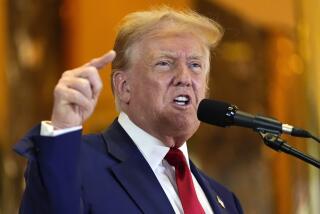From Whitewater to This
- Share via
Now, it can be hoped, the end of the Monica Lewinsky matter is in sight. Independent counsel Kenneth W. Starr has his deal to have the former White House intern testify before the Whitewater grand jury about whether she had sex with Bill Clinton. While it’s risky to speculate about what Lewinsky will say, sources claim that she will testify that they did. And when President Clinton provides his own videotaped testimony Aug. 17, he may deny that, as he has previously in court documents.
What then? Starr has sought evidence that Clinton committed perjury or asked others to do so. But a federal grand jury cannot indict a sitting president on a criminal charge. The Constitution delegates that power to the House of Representatives as part of an impeachment proceeding. So what Starr will do is write a report to the House on the findings of his Lewinsky investigation, which has dragged on now for more than six months.
Will the 435 members of the House rush to indict the president for having extramarital sex and then not telling the truth about it? Not likely. Do members of Congress facing reelection in a few months want the nation distracted by televised hearings that, at best, may tell voters what most believe they already know? Probably not.
Where will that leave us? There is no question that the integrity and personal stature of the president have been severely damaged by this messy business. Previously, Clinton denied ever having sex with Gennifer Flowers and then finally admitted that he had.
Clinton still has strong public support for the job he is doing as president, but no matter how the Lewinsky case is resolved, it will remain a cloud over his presidency. It must be perfectly clear at the White House: Clinton needs to be candid with the grand jury and open and frank with the American public, as he promised last January. Perhaps then he can re-energize his administration for his final two years in office.
Congress may be asked to ponder the tortured path by which a shady Arkansas land deal that occurred well before Clinton became president persists to this day in the form of a Whitewater grand jury investigating allegations of illicit sex in the White House. Clearly, the independent counsel law needs a careful reexamination when it comes up for renewal in Congress. The nation must have a system for impartial investigation of potential lawbreaking by high government officials, but the Whitewater probe seems to have taken on a life of its own, attaching itself to a variety of subjects along the way.
It may also be helpful to remember--as Times staff writer David G. Savage noted in Wednesday’s editions--that six months of investigating the Lewinsky affair has brought us right back to where we started, with allegations that the president had sex with Lewinsky and lied about it. We must analyze what damage has been done to the institution of the presidency in the process.
There are times when it is critical that a president be able to maintain confidences, whether negotiating with a foreign power, making national security decisions or dealing with a host of other matters. The Lewinsky investigation tattered the curtain of presumed confidentiality in the areas of the president’s relationships with the Secret Service and White House lawyers. And now we face a court precedent that the president may face civil litigation while in office.
Our presidents are not above the law. They must be accountable to the people. But that does not justify creating a permanent institution steeped in politics that makes it possible to hound presidents of either party out of office.
More to Read
Get the L.A. Times Politics newsletter
Deeply reported insights into legislation, politics and policy from Sacramento, Washington and beyond. In your inbox twice per week.
You may occasionally receive promotional content from the Los Angeles Times.










